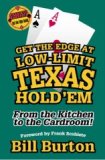
Get the Edge at Low Limit Texas Hold'em
Playing in a Short Handed Texas Hold'em Game
In most cardrooms and on the Internet poker sites the Texas Hold’em table can accommodate either nine or ten players. Non-tournament poker games are called “ring” games or “cash”
There are many times when you are playing Texas Hold’em where you will find yourself at a table that is not full. This is known as short-handed play. It can happen when some players have left the game and no one is on the waiting list to take their place or when one or tow players leave the table temporally to take a break.
Many players will avoid playing in short-handed games and in doing so they are missing out on a profitable situation. Many times a short handed game can be more profitable to playing at a full table if you know how to adjust for the reduced number of players. The blinds will come around faster and many times the pots will be smaller but you will be playing more hands than you would at a full table. You will also be raking in more pots if you become proficient at short handed play.
You make more money from the other people’s bad play than you do from your own fancy play. In a full game you will usually find two or three bad players along with a few good players. If you can get into a short handed game with mostly bad players you have a greater opportunity to make money. Because of this game selection will be important. If your shot handed game consist of only good players you might want to just drop out and avoid this game.
You will likely encounter more fluctuations in your bankroll when you play in a short handed game. You will be playing more hands to the river that offer smaller edges than in a full game. Over time however you will find as you gain experience in short handed games that the swing will not be a great.
Playing in a short handed game is like playing in late position in a full game where everyone else has folded. Your starting hands will the ones that you usually play form late position.
Many times you will find that players will raise with weaker hands than they would in a full game. They are also more apt to defend their blinds in a short handed game. If they are not raising a lot on the button or defending their blinds then YOU SHOULD!
In a short handed game you want to be the aggressor. Mix up your play more by calling in some situations when you should raise. Raise in situations where you should call or fold. If a tight player is the big blind try to steal by raising more often even from early position. You may bluff a little more than you normally would but back off doing this if there are any calling stations in the game.
Since most players will be playing looser the chances of a middle pair being the best hand after the flop will be greater. Example if your hold Queen-Ten and the flop is: Ace- Ten-five. It is likely that your pair of tens could be the best hand. Don’t automatically fold if there is a bet in front of you. Remember other players may be betting just to represent the ace even though they don’t have it.
After a while you will get a feel for short handed play. Just remember to pay close attention to the style of the other players and adjust accordingly. Becoming proficient at playing in short handed situations will take some practice but it will be worthwhile once you master it.
Overcoming the rake in a low limit game is tough enough at a full table. In a shorthanded game it is too much. Many cardrooms will cut or eliminate the rake for a short handed table. It is harder to get a game started than it is to keep one going so it is in their best interest to keep a game from disbanding. All you have to do is call over the floor person when your game drops to five or six players and ask if they can do something about the rake. Many cardrooms have a set policy and you can inquire before you sit down to play.
